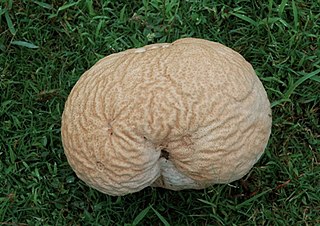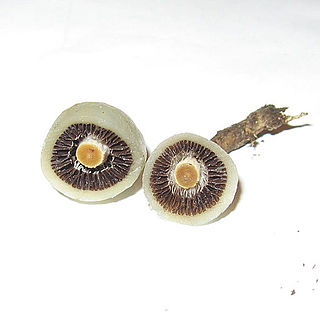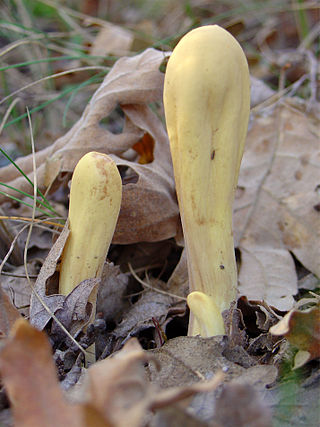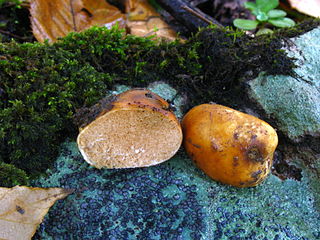
Stereum is the type genus of the Stereaceae family of fungi, in the Russulales order. Until recently, the genus was classified in the Corticiaceae family, of the Corticiales order. However, it was given its own family as a result of the split-up of the Corticiales. Common names for species of this genus include leaf fungus, wax fungus, and shelf fungus. Fungi having a shape similar to a Stereum are said to have a stereoid shape. Stereum contains 27 species that have a widespread distribution.

Calvatia is a genus of puffball mushrooms that includes the giant puffball C. gigantea. It was formerly classified within the now-obsolete order Lycoperdales, which, following a restructuring of fungal taxonomy brought about by molecular phylogeny, has been split; the puffballs, Calvatia spp. are now placed in the family Agaricaceae of the order Agaricales.

Parasola is a genus of coprinoid mushrooms in the family Psathyrellaceae. These small frail fungi have translucent caps where the radiating gills look like the spokes of a parasol. In the past these mushrooms were classified under Coprinus, but unlike that genus there is no veil and the caps do not really turn to ink, but curl up and wither.

Tylopilus is a genus of over 100 species of mycorrhizal bolete fungi separated from Boletus. Its best known member is the bitter bolete, the only species found in Europe. More species are found in North America, such as the edible species T. alboater. Australia is another continent where many species are found. All members of the genus form mycorrhizal relationships with trees. Members of the genus are distinguished by their pinkish pore surfaces.

Arrhenia is a genus of fungi in the family Hygrophoraceae. Arrhenia also includes species formerly placed in the genera Leptoglossum and Phaeotellus and the lectotype species itself has an unusual growth form that would not normally be called agaricoid. All of the species grow in association with photosynthetic cryptogams such as mosses, including peat moss, and alga scums on decaying wood, and soil crusts consisting of mixes of such organisms. Typically the fruitbodies of Arrhenia species are grey to black or blackish brown, being pigmented by incrusting melanized pigments on the hyphae.

Weraroa was a genus of mushrooms from the families Hymenogastraceae and Strophariaceae. The genus was initially described by mycologist Rolf Singer in 1958 to accommodate the single species Secotium novae-zelandiae reported by Gordon Herriott Cunningham in 1924. It was thought that the genus represented an intermediary evolutionary stage between a hypogeous (underground) ancestor and the related epigeous genus Stropharia. Advances in phylogenetics and taxonomic changes since 1958 found it contained unrelated species from multiple genera. It is now considered a synonym of the genus Psilocybe.

Lentinus is a genus of fungi in the family Polyporaceae. The genus is widely distributed, with many species found in subtropical regions.

Phylloporus is a genus of fungi in the family Boletaceae. The genus has a cosmopolitan distribution, and contains about 50 species, mostly in tropical areas.

Clavariadelphus is a genus of club fungi in the family Clavariadelphaceae. The genus has a widespread distribution in temperate areas, and contains an estimated 19 species. The name might mean uterus-shaped club, from the Latin clava meaning club and the Greek delphus meaning uterus.

Campanella is a genus of fungi in the family Marasmiaceae. The genus has a widespread distribution, especially in tropical regions, and contains about 40 species.

Zelleromyces is a genus of fungi in the family Russulaceae. It was first described by mycologists Rolf Singer and Alexander H. Smith in 1960 to contain hypogeous (underground) fungi with gasteroid fruit bodies that "bleed" latex when they are cut.

Octaviania is a genus of truffle-like fungi in the family Boletaceae. The widespread genus is estimated to contain 15 species.












